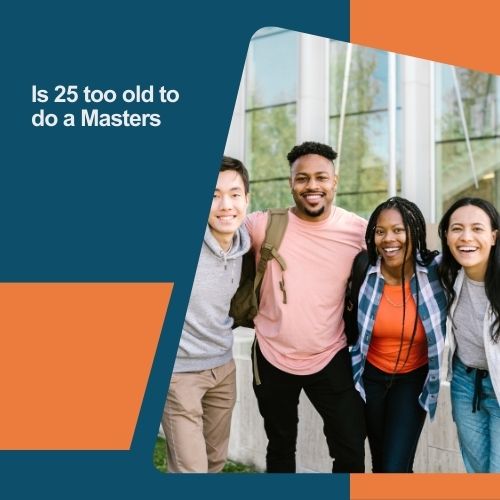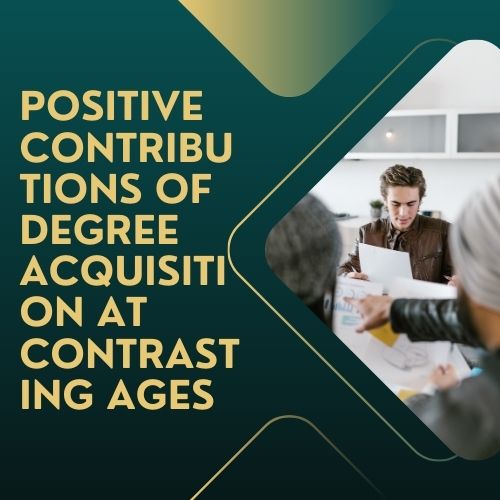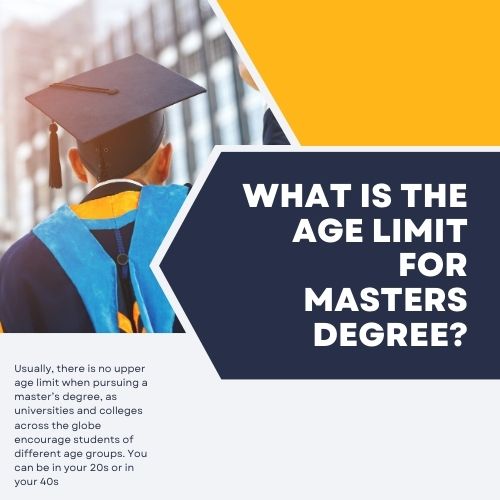Things You Should Keep in Mind:
Entry Requirements:
Generally, this is a compulsory requirement.
Work experience or specific qualifications might be compulsory for some programmes, depending on the programme content.
Career Aspirations:
For many older students, the primary purpose of acquiring a master’s degree is for earning advancement in one’s career, making a transition or acquiring new skills.
Training Formats:
Older students or working professionals may consider enrolling in ‘**part-time, online, or blended programmes,’ which many universities have on offer.’
Public Opinion:
Even though in some cultures or regions it is not usual to pursue further education at this age, there is a gradual increase in it as the world recognises that learning is a continuous process.
The greatest common denominator in this – age, is not a limitation. What is some, is the motivation. If one is looking to better themselves personally or professionally, they will do even without an excessive amount of age-appropriate constraints or programmes’ qualifications to meet.
Is 25 too old to do a Masters

No, 25 isn’t just young for a master’s degree, it is the most opportune age for one. There are people who even begin a master’s programme in their mid-twenties. There are several students who finish their undergraduate studies and take a break to work, search for a job, or find a focus before continuing their education towards a master’s.
In fact this is the Great Age for a Master’s degree:
Clarity and Focus
Age 25 is a good age to apply to a master’s because at that point, you have already established roots in a career and have an inkling of what goals you want to pursue. This will help you in churning out more motivation throughout the programme.
Masters students with employment experience are rarer, this makes those with a few years of either practical, analytical or theoretical knowledge in much regard over their peers.
Networking Opportunities:
From the ages of 25, you can begin building a network by focusing on classmates, teachers or even industry professionals who can help you in building a successful career.
currently most mid to late 25s students are enrolling to various master’s courses and programmes target those who are most mid to late in life.
The pursuit of a master’s degree can be as a means of pursuing further studies or for employment enhancement or self-satisfaction. Starting at the age of 25 seems to be in order and does have its advantages.
How old is the average person with a Masters
How Old is the Average Person with a Master’s Degree?
Undertaking the pursuit of a master’s degree is the pinnacle journey in a person’s learning and career. Despite the absence of an established age for earning a master’s degree, it seems that people are influenced by societal, occupational, and personal factors in such a way that certain patterns emerge. On average, however, the average age of a person having a master’s degree is as high as twenty-seven to thirty years old. Nevertheless, this classification can be highly affected by regions, areas of specialisation, and even personal determinants.
In this paper, we shall analyse the factors that affect the age of attaining the highest academic qualification, the age variations across different regions, and the occurrence of these degrees within the matrimonial as well as occupational spheres.
There are those who take additional time to earn a bachelor’s degree, work to gain experience, or simply try to find what they want to do in life. A good proportion of such individuals may pursue a master’s course in their late twenties or perhaps later.
It is very common in the professions such as business, education, or healthcare to gain professional experience prior to pursuing a master’s degree. For example:
Students of MBA programmes have at least 2-5 years of work experience, which means students can begin their programme when they are 26–30 years of age.
Many education degree holders working as teachers now have a few years of teaching experience themselves and pursue degrees in education, with their age ranging from 25–30 years.
In contrast with the above-mentioned patterns, students pursuing master’s level degrees in science or humanities do not take any break after completing their bachelor’s degree.
- A substantial proportion of master’s degree students are employed full-time, which is why they pursue a part-time master’s programme. Such programmes target mature students, with the average degree age reaching into the mid to late 30s or 40s.
- The periods during which people pursue master’s degrees are not the same for all disciplines.
- STEM (Science, Technology, Engineering, Mathematics): A good number of people obtain their masters in their early 20s with plans to pursue a PhD or work in a technical field.
- Business and Management: Many students that enrol for their MBA programmes are already professionals, hence the average age is between 28–32 years.
- Education and Social Work: Since these fields are heavily focused on work experience, the average age of graduates is late 20s to early 30s.
- In a few professions, a master’s degree is a prerequisite for advancement in the career ladder. For instance:Teachers who want more responsibility or a higher salary often obtain a master’s for the first time in their late 20s or early 30s.Engineers are already in their mid-twenties when they decide to add a master’s to their degrees in order to concentrate on one technical field.
Cultural and Regional Differences
- In countries that promote lifelong education, for example in the US, people can be of any age when obtaining a master’s degree, as a considerable number of older students are present.
On the other hand, Europe has a fairly common practice of integrated master’s programmes. Graduates tend to be younger because they often obtain a master’s degree at the same time that they graduate from university, which is usually around 23–25 years old.
It is widely understood that other influences such as financial security or commitments, life ambitions do play a part in when indeed a person seeks to achieve the master’s. For a great many people, that is quite literally the case; they will only go back to school when they have enough funds or have built a career first and have some resources.
In Europe, the Bologna Process systematically allows students to proceed from bachelor’s to master’s programmes with the average age of completing a degree being around 23 – 25 years. Nonetheless, in the case of business or law, an increasing number of learners above the average age are pursuing a master’s degree so that they may enhance their skills.
Japan and India, on the other hand, typically see students pursuing a master’s degree in their early to mid-twenties. However, with increasing career aspirations, the mid-career learner population is also increasing.
In developing countries, it is common to see individuals of a more advanced age pursuing master’s degrees (30s or 40s) as a result of the earlier mentioned factors such as economic factors or an inability to have higher education institutions within proximity during their youth.
Positive Contributions of Degree Acquisition at Contrasting Ages

- With regards to level of employment, there has been rapid access into higher positions or specialisation that comes with increased pay.
- Younger individuals are given the chance to pursue further education such as PhD qualifications at an early age.
- Employment rates increase during the periods of early career phases.
- Because there is insufficient real-life experience, the practical application of the degree may be hindered.
- Individual scholarly countries, as they are combined with real-world experience, experience more exposure and overall impact from studies.
- Knowing what one seeks to achieve aids in promoting effective research in particular fields due to clearer goals.
- Peers in the same professional hourglass being able to foster new networks and studying can prove to be difficult.
- It makes it possible to either move up career ladders or move to other sectors.
- People older than average students in the class have experience in a professional field and this augments discipline and seriousness.
- There is a chance of facing challenges adjusting to academic life after a long break.
- Constraints such as time and finances may be problematic.
The Trend of Lifelong Learning Within Society
With the more expanded opportunities for education and changes in the labour market, the age of the average master’s degree holder starts to diversify steadily. The concept of lifelong learning explains why many feel this need and how people pursue higher education during the course of their lives due to self-interest, career advancement, or the ability to perform within a particular niche in the labour market.
The availability of online or flexible formats for master’s programmes also facilitated this trend. The availability of these platforms promoting part-time and distance education allows mature individuals in their 30s, 40s and older to obtain higher professional degrees without compromising their work and family aspirations.

